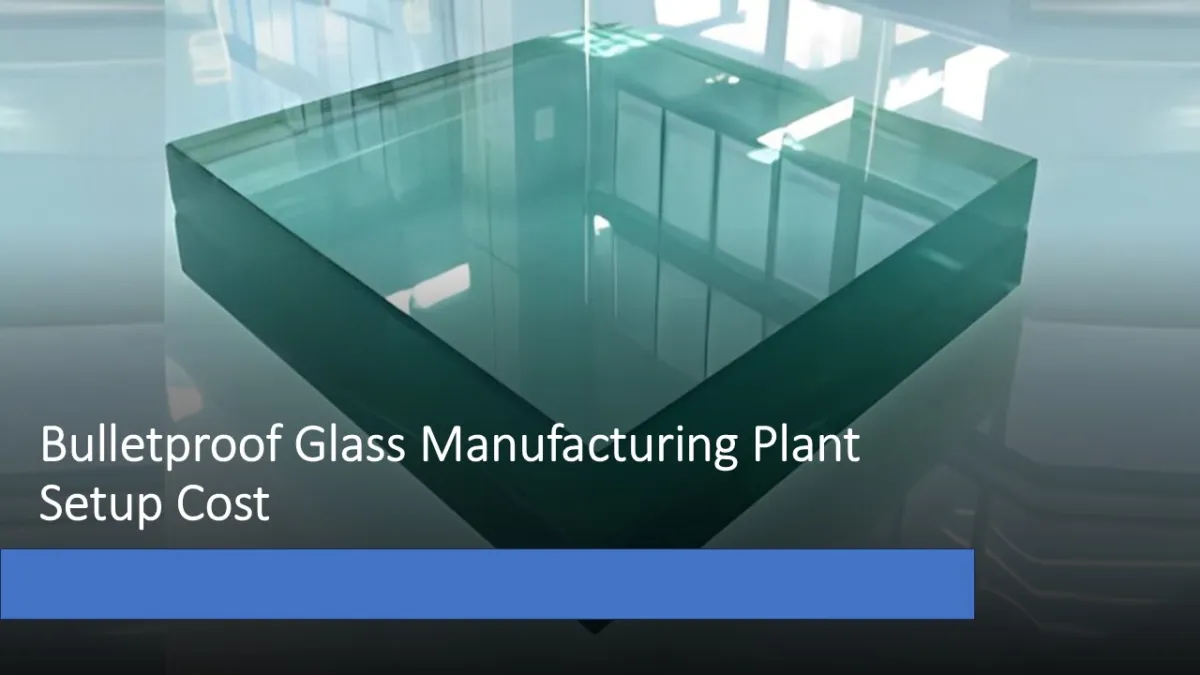
Bulletproof Glass Manufacturing Plant Setup 2025: Technical Requirements, Cost Structure, And ROI Analysis
Setting up a bulletproof glass production plant involves establishing specialized lamination facilities, autoclaves, cutting and polishing units, and quality testing labs. The setup requires high-grade raw materials like glass sheets, polycarbonate layers, and adhesives, along with compliance to ballistic safety standards.
IMARC Group's report, titled “Bulletproof Glass Manufacturing Plant Setup Cost 2025: Industry Trends, Plant Setup, Machinery, Raw Materials, Investment Opportunities, Cost and Revenue,” provides a complete roadmap for setting up a bulletproof glass manufacturing plant. It covers a comprehensive market overview to micro-level information such as unit operations involved, raw material requirements, utility requirements, infrastructure requirements, machinery and technology requirements, manpower requirements, packaging requirements, transportation requirements, etc.
Bulletproof Glass Industry Outlook 2025
The bulletproof glass industry is expected to grow steadily in 2025, fueled by rising global security concerns, defense modernization, and increasing demand for armored vehicles and secure infrastructure. Expanding applications in banking, retail, and transportation will further boost industry growth worldwide.
Request for a Sample Report: https://www.imarcgroup.com/bulletproof-glass-manufacturing-plant-project-report/requestsample
Key Insights for Setting Up a Bulletproof Glass Manufacturing Plant
Detailed Process Flow
-
Product Overview
Unit Operations Involved
Mass Balance and Raw Material Requirements
Quality Assurance Criteria
Technical Tests
Project Details, Requirements and Costs Involved:
-
Land, Location and Site Development
Plant Layout
Machinery Requirements and Costs
Raw Material Requirements and Costs
Packaging Requirements and Costs
Transportation Requirements and Costs
Utility Requirements and Costs
Human Resource Requirements and Costs
Capital Expenditure (CapEx) and Operational Expenditure (OpEx) Analysis:
Project Economics:
-
Capital Investments
Operating Costs
Expenditure Projections
Revenue Projections
Taxation and Depreciation
Profit Projections
Financial Analysis
Profitability Analysis:
-
Total Income
Total Expenditure
Gross Profit
Gross Margin
Net Profit
Net Margin
Key Cost Components
-
Land and Infrastructure: Manufacturing halls, lamination chambers, safety zones, and storage areas.
Machinery and Equipment: Autoclaves, laminating machines, glass cutting and polishing units, bonding systems, and testing devices.
Raw Materials: High-strength glass sheets, polycarbonate layers, adhesives, interlayers, and protective films.
Labor and Workforce: Glass technologists, engineers, skilled technicians, safety inspectors, and assembly staff.
Technology and R&D: Advanced lamination methods, impact resistance innovation, lightweight designs, and clarity enhancement.
Utilities: Electricity, water, HVAC, compressed air systems, and waste treatment.
Quality Control and Testing: Ballistic testing chambers, impact resistance equipment, safety certifications, and durability labs.
Packaging and Logistics: Shock-resistant packaging, pallets, protective wraps, and armored transport logistics.
Regulatory and Compliance Costs: Defense certifications, ballistic safety standards, and export/import licenses.
Economic Trends Influencing Bulletproof Glass Plant Setup Costs 2025
-
Rising Security Spending: Increased defense and homeland security budgets worldwide.
Growing Infrastructure Investments: Banks, embassies, and transport hubs adopting advanced security glass.
Raw Material Price Fluctuations: Costs of glass and polycarbonate affecting production economics.
Technological Advancements: Demand for lightweight, high-strength transparent armor driving R&D spending.
Government Incentives: Policies supporting defense and security manufacturing projects.
Request For Customization: https://www.imarcgroup.com/request?type=report&id=8765&flag=E
Challenges and Considerations for Investors
-
High Capital Costs: Significant investment required for specialized machinery and testing facilities.
Strict Regulations: Compliance with ballistic safety and defense manufacturing standards.
Skilled Workforce Requirement: Need for specialized glass engineers and technicians.
Global Competition: Dominance of established international players in defense and security glass.
Market Dependency: Demand tied to defense budgets, security spending, and geopolitical conditions.
Conclusion:
The bulletproof glass industry in 2025 offers strong opportunities driven by rising defense needs, infrastructure security, and commercial applications. However, investors must address high setup costs, regulatory hurdles, and global competition while leveraging opportunities in innovation and expanding security requirements.
About Us:
IMARC Group is a global management consulting firm that helps the world's most ambitious changemakers to create a lasting impact. The company excel in understanding its client's business priorities and delivering tailored solutions that drive meaningful outcomes. We provide a comprehensive suite of market entry and expansion services. Our offerings include thorough market assessment, feasibility studies, company incorporation assistance, factory setup support, regulatory approvals and licensing navigation, branding, marketing and sales strategies, competitive landscape, and benchmarking analyses, pricing and cost research, and procurement research.
Contact Us:
IMARC Group
134 N 4th St. Brooklyn, NY 11249, USA
Email:
Tel No:(D) +91 120 433 0800
United States: (+1-201971-6302)
Legal Disclaimer:
MENAFN provides the
information “as is” without warranty of any kind. We do not accept
any responsibility or liability for the accuracy, content, images,
videos, licenses, completeness, legality, or reliability of the information
contained in this article. If you have any complaints or copyright
issues related to this article, kindly contact the provider above.
Most popular stories
Market Research

- Luminadata Unveils GAAP & SOX-Trained AI Agents Achieving 99.8% Reconciliation Accuracy
- Whale.Io Launches Battlepass Season 3, Featuring $77,000 In Crypto Casino Rewards
- Easystaff Data Reveals 6.8× Growth In Payroll Use Of Stablecoins
- Pepeto Presale Exceeds $6.93 Million Staking And Exchange Demo Released
- Simplefx Relaunches First Deposit Bonus
- Alt.Town Introduces $TOWN Token Utility Across Platform Services And Launches Valuefi Deposit Event




















Comments
No comment